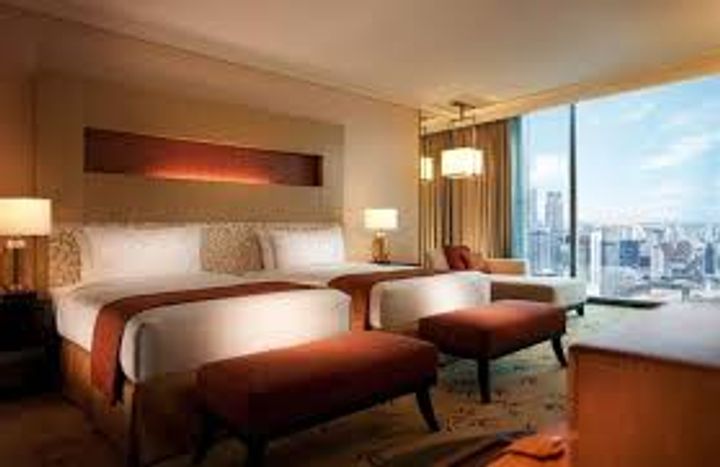
Hotels: More Than Just a Room Key – Guide to Modern Hospitality
Imagine stepping into a hotel, not just as a traveler seeking a place to rest, but as an explorer entering a world of possibilities. Beyond the crisp sheets and the promise of a good night's sleep, hotels have evolved into multifaceted hubs offering experiences that cater to every whim and need. Have you ever considered the intricate dance of services that a modern hotel provides, from concierge assistance arranging exclusive tours to on-site restaurants crafting culinary masterpieces? Are you aware of the significant role hotels play in shaping travel experiences and contributing to local economies? What truly differentiates a memorable hotel stay from a merely adequate one, and how can you ensure your next booking unlocks a world of unexpected delights?
This article delves deep into the dynamic world of hotels, revealing the countless ways they extend beyond the simple function of providing accommodation. We'll explore the diverse range of hotel types, from budget-friendly options to luxurious retreats, uncover the key features and core benefits that enhance the guest experience, and offer practical tips for choosing the perfect hotel to suit your individual needs. Furthermore, we'll discuss the cost considerations involved, highlight some of the top hotel brands in the industry, and even share a few care and maintenance tips to keep your hotel room feeling fresh and inviting. So, prepare to redefine your understanding of hotels and discover the hidden treasures they hold.
Topic Overview
A hotel, in its simplest definition, is a commercial establishment that provides lodging, meals, and other services to travelers and tourists. However, this definition significantly undersells the modern hotel experience. Hotels are now complex ecosystems offering a wide array of amenities and services, aiming to cater to the diverse needs of their guests. They act as temporary homes, business centers, event venues, and even culinary destinations.
The importance of hotels extends far beyond individual travelers. They are crucial engines of economic growth, contributing significantly to local economies through job creation, tourism revenue, and partnerships with local businesses. Furthermore, hotels play a vital role in shaping the overall travel experience, influencing a traveler's perception of a destination and their overall satisfaction with their trip.
How It Works
Understanding the inner workings of a hotel can enhance your appreciation for the service you receive and help you navigate your stay more effectively. The operation of a hotel involves a complex interplay of various departments working seamlessly together.
Booking and Check-in: The guest initiates the process by booking a room, either online, through a travel agent, or directly with the hotel. Upon arrival, the check-in process involves verifying identification, confirming reservation details, and issuing a room key.
Guest Services: This encompasses a wide range of services designed to enhance the guest experience, including concierge assistance, housekeeping, room service, laundry, and bellhop services.
Operations and Maintenance: This department is responsible for ensuring the smooth functioning of the hotel, including maintaining the physical infrastructure, managing utilities, and ensuring the cleanliness and safety of the premises.
Check-out and Billing: Upon departure, the check-out process involves settling any outstanding charges, returning the room key, and providing feedback on the stay.
Types of Hotels
The hotel industry is incredibly diverse, offering a wide range of accommodation options to cater to different budgets, preferences, and travel styles.
Budget Hotels: Offer basic accommodation at affordable prices, focusing on providing clean and comfortable rooms without extensive amenities.
Boutique Hotels: Smaller, more intimate hotels with a unique design and personalized service, often located in trendy neighborhoods.
Luxury Hotels: Offer high-end accommodation with premium amenities, exquisite dining options, and impeccable service.
Resorts: Located in scenic destinations, resorts offer a wide range of recreational activities, such as swimming, golfing, and spa treatments.
Extended Stay Hotels: Designed for long-term stays, these hotels offer apartment-style rooms with kitchenettes and laundry facilities.
Key Features
Modern hotels offer a plethora of features designed to enhance the comfort, convenience, and overall satisfaction of their guests. These features can range from basic necessities to luxurious amenities.
High-Speed Wi-Fi: Essential for both business and leisure travelers, providing seamless connectivity for work, communication, and entertainment.
On-Site Dining: Restaurants, bars, and cafes offering a variety of culinary options, from casual meals to fine dining experiences.
Fitness Centers: Equipped with modern exercise equipment, allowing guests to maintain their fitness routines while traveling.
Swimming Pools: Providing a refreshing escape and a relaxing environment for both adults and children.
To truly enhance your stay, look for hotels that offer personalized concierge services. This feature can significantly elevate your experience by providing tailored recommendations and assistance.
Core Benefits
Staying in a hotel offers numerous benefits that extend beyond just having a place to sleep. Hotels provide a range of services and amenities that can enhance your travel experience and make your trip more enjoyable and productive.
Convenience: Hotels offer convenient access to amenities and services, such as restaurants, transportation, and attractions.
Comfort: Providing comfortable and well-equipped rooms, allowing guests to relax and recharge after a long day of travel or activities.
Security: Hotels offer enhanced security measures, providing guests with peace of mind and a safe environment.
Productivity: Equipped with business centers and high-speed Wi-Fi, hotels provide a conducive environment for work and meetings.
Applications / Who Needs This?
Hotels cater to a wide range of individuals and groups, each with their unique needs and requirements. From business travelers to families on vacation, hotels provide a versatile accommodation solution.
Business Travelers: Seeking convenient access to meeting facilities, business centers, and reliable Wi-Fi.
Leisure Travelers: Looking for comfortable accommodation, convenient access to attractions, and recreational activities.
Families: Requiring spacious rooms, family-friendly amenities, and convenient access to family-oriented attractions.
Event Attendees: Needing accommodation close to event venues, convenient transportation options, and group booking facilities.
Cost Considerations
The cost of staying in a hotel can vary significantly depending on several factors, including the location, type of hotel, time of year, and amenities offered. Understanding these cost considerations can help you make informed decisions and find accommodation that fits your budget.
The approximate cost of a budget hotel room can range from around $50 to $100 USD per night, offering basic amenities and comfortable accommodation.
A mid-range hotel room typically costs around $100 to $250 USD per night, providing a balance of comfort, convenience, and amenities.
Luxury hotels can range from around $250 USD per night and upwards, offering premium amenities, exceptional service, and exquisite dining options. Keep in mind that prices fluctuate based on demand and availability.
How to Choose / Tips for Succes
Choosing the right hotel can significantly impact your overall travel experience. Consider your priorities, budget, and travel style when making your decision. Researching different hotels and reading reviews can help you make an informed choice.
1. Define Your Needs: Determine your priorities, such as location, amenities, and budget, to narrow down your options.
2. Read Reviews: Check online reviews from previous guests to get an unbiased perspective on the hotel's quality and service.
3. Compare Prices: Shop around and compare prices from different booking platforms to find the best deals.
4. Consider Location: Choose a hotel that is conveniently located near the attractions, transportation, or business venues you plan to visit.
5. Check Amenities: Ensure the hotel offers the amenities that are important to you, such as Wi-Fi, on-site dining, or a fitness center.
When looking for hotels, always check for deals on major booking platforms. These platforms often offer discounts and special promotions that can save you money.
Top 3–4 Recommended Brands/Providers
The hotel industry is dominated by several well-established brands that are known for their quality, service, and consistency. These brands offer a wide range of accommodation options to cater to different budgets and preferences.
Marriott International: One of the largest hotel chains in the world, offering a diverse portfolio of brands, including Ritz-Carlton, St. Regis, and Marriott Hotels.
Hilton Worldwide: Another leading hotel chain, offering a wide range of brands, including Waldorf Astoria, Conrad Hotels & Resorts, and Hilton Hotels & Resorts.
Hyatt Hotels Corporation: Known for its luxury and upscale hotels, offering brands such as Park Hyatt, Grand Hyatt, and Hyatt Regency.
InterContinental Hotels Group (IHG): A global hotel company with brands such as InterContinental Hotels & Resorts, Crowne Plaza Hotels & Resorts, and Holiday Inn.
Care and Maintenance Tips
While you don't own the hotel room, there are a few things you can do to keep it clean and comfortable during your stay. These simple care and maintenance tips can enhance your overall experience and make your temporary home more enjoyable.
Keep it Tidy: Make your bed each morning and tidy up any personal belongings to maintain a sense of order.
Ventilate the Room: Open the windows or use the air conditioning to circulate fresh air and prevent stuffiness.
Use the Amenities Responsibly: Conserve water and electricity by turning off lights and faucets when not in use.
Report any Issues: Promptly report any maintenance issues or concerns to the hotel staff to ensure they are addressed quickly.
Bonus Resources
To further enhance your knowledge and understanding of the hotel industry, here are a few helpful external resources.
Explore the offerings of major chains on Choice Hotels' official website to get an idea of what's available.
Find useful insights on hotel booking from this TripAdvisor guide on hotel reviews and ratings. Get other traveler’s perspective on hotels before your stay.
Final Thoughts / Conclusion
As we've explored, hotels are far more than just a place to lay your head for the night. They are dynamic hubs offering a multitude of services, experiences, and conveniences designed to enhance your travel experience. From budget-friendly accommodations to luxurious retreats, hotels cater to a diverse range of needs and preferences, playing a crucial role in shaping our overall perception of a destination.
Remember those questions we posed at the beginning? Hotels offer a dance of services, from personalized concierge assistance to diverse on-site dining. They significantly impact travel experiences, contributing substantially to local economies. What differentiates a stay? It’s the blend of impeccable service, strategic location, and unique amenities tailored to your needs.
By understanding the different types of hotels, their key features, and core benefits, you can make informed decisions and choose the perfect hotel to suit your individual requirements. Whether you're a business traveler seeking productivity or a leisure traveler seeking relaxation, hotels offer a versatile accommodation solution that can enhance your trip in countless ways. So, the next time you book a hotel, remember that you're not just booking a room key; you're unlocking a world of possibilities and experiences. Make sure to choose wisely and take full advantage of the offerings available to create a truly memorable stay.
Frequently Asked Questions (FAQ)
Q: What is the difference between a hotel and a motel?
A: Generally, hotels offer more amenities and services than motels, such as on-site dining, concierge services, and meeting facilities. Motels typically offer basic accommodation with limited amenities, often located along highways for travelers.
Q: What is a resort fee?
A: A resort fee is a mandatory fee charged by some hotels and resorts to cover the cost of amenities such as Wi-Fi, pool access, and fitness center access. These fees are typically charged per night, in addition to the room rate.
Q: How can I find the best deals on hotel rooms?
A: To find the best deals on hotel rooms, compare prices from different booking platforms, consider traveling during the off-season, and look for hotels that offer discounts or special promotions.
Q: What is the difference between a standard room and a suite?
A: A standard room typically consists of a single room with a bed, bathroom, and basic amenities. A suite, on the other hand, is a larger accommodation that includes a separate living area, bedroom, and often a kitchenette or dining area.
Q: What should I do if I have a problem with my hotel room?
A: If you have a problem with your hotel room, such as a broken appliance or a cleanliness issue, promptly report it to the hotel staff. They will typically address the issue as quickly as possible to ensure your comfort and satisfaction.










